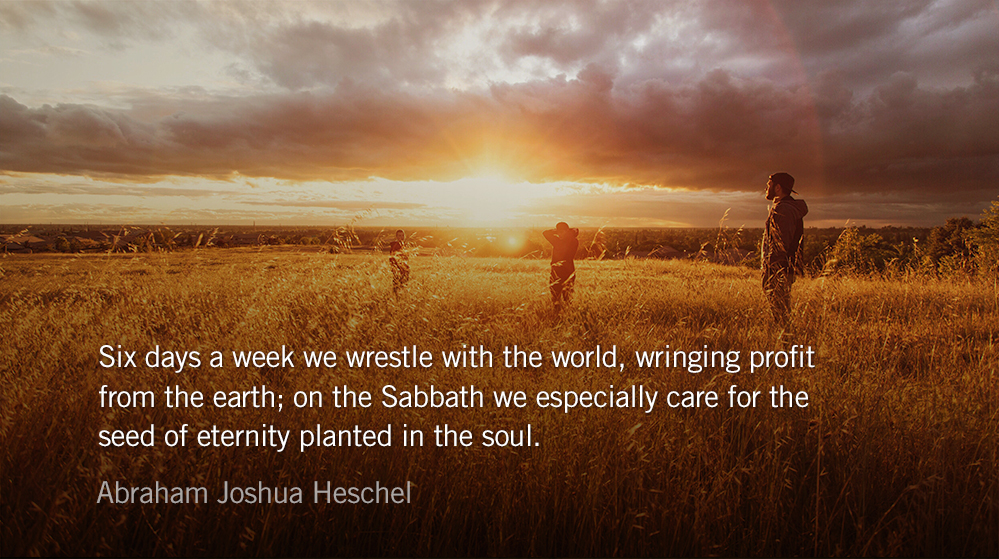We have turned to Abraham Joshua Heschel this week to recover some of the tension lost when we, as western Christians, read the Hebrew Scriptures. Instead of publishing his thoughts with commentary we chose to present them in full force—allowing the rabbi’s words to confront, challenge, and inspire our faith.
I first entered the flourishing world of Heschel’s writings through his works on the Sabbath. The kind of rest he presents as normative for God’s people had been long-missing from my personal faith. I remember becoming captivated by his vision of rest and relationship—and quickly found myself longing for true sabbath.
So today, may we find the rest Rabbi Heschel says is the invitation of God for everyone of faith:
He who wants to enter the holiness of the day must first lay down the profanity of clattering commerce, of being yoked to toil. He must go away from the screech of dissonant days, from the nervousness and fury of acquisitiveness and the betrayal in embezzling his own life. He must say farewell to manual work and learn to understand that the world has already been created and will survive without the help of man.
Six days a week we wrestle with the world, wringing profit from the earth; on the Sabbath we especially care for the seed of eternity planted in the soul. The world has our hands, but our soul belongs to Someone Else. Six days a week we seek to dominate the world, on the seventh day we try to dominate the self.
[The Hebrew word] menuha, which we usually render with “rest”, means here much more than withdrawal from labor and exertion, more than freedom from toil, strain or activity of any kind. Menuha is not a negative concept but something real and intrinsically positive.The essence of good life is menuha. “The Lord is my shepherd; I shall not want. He makes me lie down in green pastures. He leads me beside still waters” (the waters of menuhot). In later times menuha became a synonym for the life in the world to come, for eternal life.
The Sabbath is a reminder of two worlds—this world and the world to come; it is an example of both worlds. For the Sabbath is joy, holiness, and rest; joy is part of this world; holiness and rest are something of the world to come.
Unlike the Day of Atonement, the Sabbath is not dedicated exclusively to spiritual goals. It is a day of the soul as well as of the body; comfort and pleasure are an integral part of the Sabbath observance. Man in his entirety, all his faculties must share its blessing.
Time is like a wasteland. It has grandeur but no beauty. Its strange, frightful power is always feared but rarely cheered. Then we arrive at the seventh day, and the Sabbath is endowed with a felicity which enraptures the soul, which glides into our thoughts with a healing sympathy. It is a day on which hours do not oust one another. It is a day that can soothe all sadness away.
A song of the Sabbath day: “It is good to give thanks unto the Lord!” Therefore, all the creatures of God bless Him.
*Abridged and adapted from The Sabbath.
Weekend Reading List
- The Sabbath. Excerpt from Abraham Joshua Heschel on MacMillon.
- I’m Honoring The Sabbath–And Fixing My Plugged-In Brain–By Putting Down My Phone. Deena Shanker for Quartz.
- Religion Is The Only Thing That Forced Me To Disconnect Weekly This Year, And Thank God. Deena Shanker for Quartz.
- The Sabbath: Its Meaning for Modern Man, by Abraham Joshua Heschel. Will Herberg for Commentary (1952).
Today’s Reading
Ezekiel 33 (Listen – 6:03)
Psalms 81-82 (Listen – 2:36)
Today’s Reading
Ezekiel 34 (Listen – 5:11) Psalms 83-84 (Listen – 3:20)
Ezekiel 35 (Listen – 2:21) Psalms 85 (Listen – 1:25)






